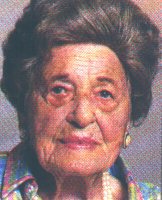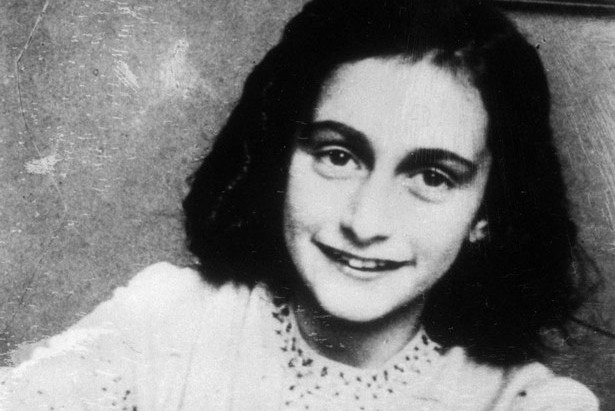
At the age of 100, remembering the horrors of the Bergen-Belsen concentration camp
BY IRMA SONNENBERG MENKEL
As Printed in July 21, 1997 Edition of Newsweek© Magazine
I TURNED 100 YEARS OLD IN APRIL AND HAD A BEAUTIFUL birthday party surrounded by my grandchildren, great grandchildren and other family members. I even danced a little. Willard Scott mentioned my name on television. But such a time is also for reflection. I decided to overcome my long reluctance to revisit terrible times. Older people must tell their stories. With the help of Jonathan Alter of NEWSWEEK, here’s a bit of mine:
I was born in Germany in 1897, got married and had two children in the 1920s. Then Hitler came to power, and like many other Jews, we fled to Holland. As the Nazis closed in, we sent one daughter abroad with relatives and the other into hiding with my sister and her children in The Hague. My husband and I could not hide so easily, and in 1941 we were sent first to Westerbork, a transit camp where we stayed about a year, and later to Bergen-Belsen, a work and transit camp, from where thousands of innocent people were sent to extermination camps. There were no ovens at Bergen-Belsen; instead the Nazis killed us with starvation and disease. My husband and brother both died there. I stayed for about three years before it was liberated in the spring of 1945. When I went in, I weighed more than 125 pounds. When I left, I weighed 78.
After I arrived at the Bergen-Belsen barracks, I was told I was to be the barracks leader. I said, “I’m not strong enough to be barracks leader.” They said that would be disobeying a command. I was terrified of this order, but had no choice. It turned out that the Nazi commandant of the camp was from my home town in Germany and had studied with my uncle in Strasbourg. This coincidence probably helped save my life. He asked to talk to me privately and wanted to know what I had heard of my uncle. I said I wanted to leave Bergen-Belsen, maybe go to Palestine. The commandant said, “If I could help you, I would, but I would lose my head.” About once every three weeks, he would ask to see me. I was always afraid. It was very dangerous. Jews were often shot over nothing. After the war, I heard he had committed suicide.
There were about 500 women and girls in my barracks. Conditions were extremely crowded and unsanitary. No heat at all. Every morning, I had to get up at 5 and wake the rest. At 6 a.m., we went to roll call. Often we had to wait there for hours, no matter the weather. Most of the day, we worked as slave labor in the factory, making bullets for German soldiers. When we left Holland, I had taken only two changes of clothes, one toothbrush, no books or other possessions. Later I had a few more clothes, including a warm jacket, which came from someone who died. Men and women lined up for hours to wash their clothes in the few sinks. There were no showers in our barracks. And no bedding. The day was spent working and waiting. At 10 p.m., lights out. At midnight, the inspection came-three or four soldiers. I had to say everything was in good condition when, in fact, the conditions were beyond miserable. Then up again at 5 a.m.
One of the children in my barracks toward the end of the war was Anne Frank, whose diary became famous after her death. I didn’t know her family beforehand, and I don’t recall much about her, but I do remember her as a quiet child. When I heard later that she was 15 when she was in the camps, I was surprised. She seemed younger to me. Pen and paper were hard to find, but I have a memory of her writing a bit. Typhus was a terrible problem, especially for the children. Of 500 in my barracks, maybe 100 got it, and most of them died. Many others starved to death. When Anne Frank got sick with typhus, I remember telling her she could stay in the barracks – she didn’t have to go to roll call.
There was so little to eat. In my early days there, we were each given one roll of bread for eight days, and we tore it up, piece by piece. One cup of black coffee a day and one cup of soup. And water. That was all. Later there was even less. When I asked the commandant for a little bit of gruel for the children’s diet, he would sometimes give me some extra cereal. Anne Frank was among those who asked for cereal, but how could I find cereal for her? It was only for the little children, and only a little bit. The children died anyway. A couple of trained nurses were among the inmates, and they reported to me. In the evening, we tried to help the sickest. In the morning, it was part of my job to tell the soldiers how many had died the night before. Then they would throw the bodies on the fire.
I have a dim memory of Anne Frank speaking of her father. She was a nice, fine person. She would say to me, “Irma, I am very sick.” I said, “No, you are not so sick.” She wanted to be reassured that she wasn’t. When she slipped into a coma, I took her in my arms. She didn’t know that she was dying. She didn’t know that she was so sick. You never know. At Bergen-Belsen, you did not have feelings anymore. You became paralyzed. In all the years since, I almost never talked about Bergen-Belsen. I couldn’t. It was too much.
When the war was over, we went in a cattle truck to a place where we stole everything out of a house. I stole a pig, and we had a butcher who slaughtered it. Eating this-when we had eaten so little before -was bad for us. It made many even sicker. But you can’t imagine how hungry we were. At the end, we had absolutely nothing to eat. I asked an American soldier holding a piece of bread if I could have a bite. He gave me the whole bread. That was really something for me.
When I got back to Holland, no one knew anything. I finally found a priest who had the address where my sister and daughter were. I didn’t know if they were living or not. They were. They had been hidden by a man who worked for my brother. That was luck. I found them and began crying. I was so thin that at first they didn’t recognize me.
There are many stories like mine, locked inside people for decades. Even my family heard only a little of this one until recently. Whatever stories you have in your family, tell them. It helps.
© Newsweek Magazine

